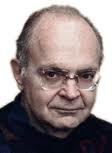Donald Ervin Knuth
Born January 10, 1938, Milwaukee, Wis.; writer and teacher of the Art of Programming, three of seven promised volumes having been completed; developer of the text language TEX.

Education: BA and MS, [The work for Knuth's bachelor's degree was so distinguished that the faculty of the Case Institute of Technology voted to award simultaneous bachelor's and master's degrees.] summa cum laude, physics, Case Institute of Technology, 1960; PhD, mathematics, California Institute of Technology, 1963.
Professional Experience: faculty member, California Institute of Technology, 1963-1968; mathematician, Institute for Defense Analysis, Princeton, N.J., 1968-1969; Fletcher Jones Professor of Computer Science, Leland Stanford Junior University, 1969-1989; professor of the Art of Programming, 1990-present.
Honors and Awards: ACM Grace Murray Hopper Award, 1971; ACM Turing Award, 1974; Lester R. Ford Award, Mathematical Association of America, 1975; National Medal of Science, 1979; IEEE McDowell Award, 1980; IEEE Computer Society Pioneer Award, 1982; Computer Science Education Award, 1986; ACM Systems Software Award, 1986; Steele Prize, Association for Management Systems, 1986; New York Academy of Sciences Award, 1987; Franklin Medal, 1988; J.D. Warnier Prize, 1989; member, National Academy of Sciences, 1975; member, National Academy of Engineering, 1981; foreign associate, L'Academie des Sciences, Paris, 1992.
Donald Knuth cannot easily be summed up in a single sentence; he is like the elephant being described by six blind men, each with a restricted "view" of the whole beast. While Knuth is most cited for his work in computer software, ranging from compilers to word processing and algorithms, each biographer will find a pinnacle of excellence to emphasize. This author would credit Knuth with the development of the concept of LR-parsing, although it took others, notably Franklin DeRemer (1971), to provide a practical methodology for implementation. Computer science educators look at Knuth's Art of Programming series of books and give him tremendous credit for enhancing the study of algorithms and data structures. The word-processing community would look to Knuth's TEX system as a prime example of the application of user needs and programming language principles to the development of a word processor which, like Unix, transcends machine boundaries. Humanists would see an organist and prolific writer.
QUOTATIONS
"I sometimes consider myself a pure mathematician, but usually I'm a pure computer scientist who has found connections between computers and mathematics."
"Science is what we understand well enough to explain to a computer; Art is everything else." (Reader's Digest, July 1987, p. 24)
"Instead of imagining that our main task is to instruct a computer what to do, let us concentrate rather on explaining to human beings what we want a computer to do." (Computer Journal, Vol. 27, 1984, p. 97)
BIBLIOGRAPHY
Biographical
Albers, Donald J., and Lynn Arthur Steen, "A Conversation with Don Knuth," Ann. Hist. Comp., Vol. 4, No. 3, July 1982, pp. 257-273.
Caddes, Carolyn, Portraits of Success: Impressions of Silicon Valley Pioneers, Tioga Publishing Co., Palo Alto, Calif., 1986.
Frenkel, Karen A., "Donald E. Knuth: Scholar with a Passion for the Particular," Profiles in Computing, Comm. ACM, Vol. 30, No. 10, Oct. 1987, pp. 816-819.
Slater, Robert, Portraits in Silicon, MIT Press, Cambridge, Mass., 1987, Chapter 31.
Significant Publications
Knuth, Donald E., "The Potrzebie System of Weights and Measures," MAD Magazine, E.C. Publications, Inc., June 1957; reprinted in Reidelbach, Maria, Completely MAD, Little, Brown, Boston, 1991, p. 191.
Knuth, Donald E., "On the Translation of Languages from Left to Right," Information and Control, Vol. 8, 1965, pp. 607-639.
Knuth, Donald E., "Von Neumann's First Computer Program," Computing Surveys, Vol. 2, 1970, pp. 247-260.
Knuth, Donald E., "Fortran: An Empirical Study of Fortran Programs," Software: Practice and Experience, Vol. 1, 1971, pp. 105-133.
Knuth, Donald E., "Ancient Babylonian Algorithms," Comm. ACM, Vol. 15, No. 7, July 1972, pp. 671-677 (errata Vol. 19, No. 2, 1976, p. 108).
Knuth, Donald E., "The Early Development of Programming Languages," in Metropolis, N., J. Howlett, and Gian-Carlo Rota, A History of Computing in the Twentieth Century, Academic Press, New York, 1980, pp. 197-273.
Knuth, Donald E., The Art of Computer Programming, 3 Vols., Addison-Wesley, Reading, Mass., 1968.
Knuth, Donald E., Computers and Typesetting, 5 Vols., Addison-Wesley, Reading, Mass., 1986.
UPDATES
Color portrait added (MRW, 2013)
New content Copyright © 2013-2023 by the IEEE Computer Society and the Institute of Electrical and Electronics Engineers Inc.
All rights reserved. This material may not be reproduced or redistributed without the express written permission of the copyright holder.
